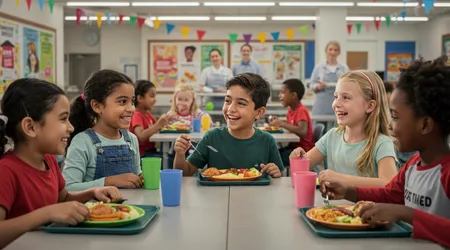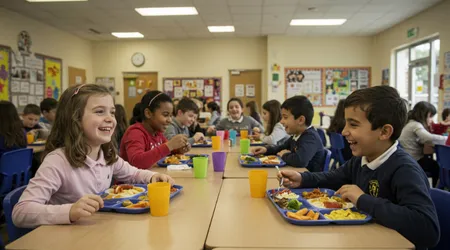Free School Meal Expansion: What Families Should Know

The free school meal expansion in England, set to transform lives from September 2026, marks a historic step toward tackling child poverty.
Announced in June 2025, this policy will extend eligibility to all children in households receiving Universal Credit, impacting over 500,000 pupils.
For families grappling with rising costs, this initiative promises relief, ensuring children access nutritious meals daily.
This blog post unpacks the policy’s implications, offering practical insights and actionable advice for parents.
From eligibility criteria to long-term benefits, we’ll explore how this change reshapes family budgets and children’s futures, empowering you with the knowledge to navigate this opportunity.
Child poverty remains a pressing issue, with 4.45 million UK children living below the poverty line in 2025, according to the Department for Work and Pensions.
The free school meal expansion addresses this by removing financial barriers to nutrition. Imagine a family as a ship navigating stormy seas without proper fuel, it falters.
Free meals act as that fuel, steadying children’s focus and health. This policy isn’t just about food; it’s about equity, opportunity, and breaking cycles of disadvantage. Let’s dive into what this means for you and your children.
Why the Free School Meal Expansion Matters
This free school meal expansion directly confronts the stark reality of child hunger in England. With nearly one in four pupils already eligible for free meals, the need is undeniable.
By extending eligibility to all Universal Credit households, the government aims to lift 100,000 children out of poverty, as stated by the Department for Education. This isn’t just policy jargon it’s a lifeline for families stretched thin by inflation and stagnant wages.
Hunger in classrooms isn’t abstract; it’s a child struggling to focus because their stomach is empty. The free school meal expansion ensures no child faces this barrier.
++ Skills England Launch: What the New Agency Means for Apprentices and Colleges
Schools report better attendance and academic performance when children are well-fed. For parents, this means peace of mind, knowing their child’s nutrition isn’t a daily gamble. The policy also simplifies access, removing the stigma of applying for aid.
Consider Sarah, a single mother in Manchester. Her two children, previously ineligible due to a £7,400 income cap, will now benefit.
This saves her nearly £500 annually per child, easing her budget for essentials like utilities.
The free school meal expansion isn’t just feeding kidsit’s giving families breathing room to thrive. Yet, questions linger: will funding keep pace with rising food costs?

Eligibility: Who Qualifies and How to Prepare
From September 2026, the free school meal expansion opens eligibility to all children in Universal Credit households, regardless of income.
Previously, families needed to earn under £7,400 annually after tax to qualify. This change simplifies the process, ensuring broader access.
If you’re on Universal Credit, your child in a state-funded school, college, or nursery automatically qualifies.
Also read: Historic UK Curriculum Shift: First Aid Training National Rollout in Scotland
Parents must verify their Universal Credit status with their child’s school. Automatic enrollment, advocated by groups like the Child Poverty Action Group, is being explored to streamline this.
For example, John, a father in Leeds, found his school’s online portal made registration seamless. Check your school’s website or contact their office to confirm requirements.
Preparation is key. Ensure your Universal Credit claim is active and notify your school by early 2026. Some local authorities may pilot auto-enrollment sooner.
The free school meal expansion removes bureaucratic hurdles, but proactive parents will secure benefits fastest. Are you ready to take advantage of this game-changer for your family?
Families new to Universal Credit should apply promptly, as processing can take weeks. Schools may also require updated contact details to ensure smooth communication.
This policy’s simplicity empowers parents, but staying informed ensures no child misses out. The free school meal expansion is a tool use it wisely to support your child’s future.
Financial and Social Benefits for Families
The free school meal expansion delivers tangible financial relief. The Department for Education estimates parents will save £500 per child annually.
For a family with two children, that’s £1,000 redirected to rent, bills, or extracurriculars. This isn’t pocket change it’s a meaningful boost for low-income households battling cost-of-living pressures.
Beyond finances, free meals reduce social stigma. Children no longer face the embarrassment of separate lunch lines or packed lunches they can’t afford.
Read more: OfS Tightens Free Speech Rules: What Universities Must Do by August
In Trafford, councillors noted that automatic enrollment eliminates the “form-filling” burden, as reported by Manchester Evening News. This fosters inclusivity, letting kids focus on learning, not their family’s income.
Take Aisha, a Birmingham mother of three. The savings from free meals allow her to enroll her daughter in dance classes, boosting confidence and social skills.
The free school meal expansion also supports mental health well-fed children are less anxious and more engaged. However, schools need adequate funding to maintain meal quality, a concern raised by caterers.
The policy’s ripple effects extend to communities. Schools receiving pupil premium funding for each free meal student gain resources for books or staff.
This strengthens the educational ecosystem, benefiting all students. Families, meanwhile, gain stability, proving that small changes can spark big outcomes.
Challenges and Concerns to Watch
While the free school meal expansion is transformative, challenges loom. Schools face funding shortfalls, with caterers reporting a mere 3p increase per meal in 2025-26, per the BBC.
This risks smaller portions or less nutritious options, undermining the policy’s intent. Schools often subsidize meals from strained budgets, a stopgap that’s unsustainable.
Another hurdle is implementation. Some MPs question how the £1 billion cost, estimated by the Institute for Fiscal Studies, will be funded.
Without clear plans, schools may struggle to scale up. Parents should monitor local authority updates to ensure smooth rollouts in their area.
Logistical issues, like kitchen capacity or staff shortages, could delay benefits. In Knowsley, 1,600 children are set to benefit, but infrastructure must keep pace.
Parents can advocate by joining school councils or contacting MPs. The free school meal expansion holds promise, but vigilance ensures it delivers.
Outreach is another concern. Not all families know about their eligibility, especially those new to Universal Credit.
Schools and charities must bridge this gap through clear communication. The policy’s success hinges on accessibility every eligible child must benefit without bureaucratic snags.
Long-Term Impact on Education and Health
Well-fed children learn better. A 2025 European Union report found that school meal programs yield a sevenfold return on investment, boosting lifetime earnings by 6% for low-income children.
The free school meal expansion sets the stage for similar gains in England, enhancing academic outcomes and reducing health disparities.
Nutrition fuels focus. Hungry children struggle with concentration, impacting grades and confidence. Free meals provide consistent, balanced diets, reducing risks of obesity and malnutrition.
For example, a Bristol school reported improved test scores after expanding meal access, showing tangible academic gains.
Health benefits extend beyond childhood. Proper nutrition lowers risks of chronic diseases, easing future healthcare costs.
The free school meal expansion is an investment in long-term well-being, giving children tools to break poverty cycles. Parents can reinforce this by encouraging healthy eating habits at home.
Communities also benefit. Schools with healthier students see higher attendance and engagement, fostering vibrant learning environments.
This policy isn’t just about today it’s about building a stronger, healthier tomorrow for England’s youth.
The Broader Fight Against Child Poverty

The free school meal expansion is a cornerstone of the government’s Child Poverty Taskforce, set to release a ten-year strategy in 2025.
It’s a “down payment” on tackling poverty, as Prime Minister Keir Starmer noted, but it’s not enough alone. Charities urge scrapping the two-child benefit cap to amplify impact.
Poverty’s roots run deep. Free meals address immediate hunger but don’t solve housing or childcare costs.
Families like Sarah’s need holistic support affordable childcare, fair wages, and benefit reforms. The free school meal expansion is a start, but systemic change requires bolder steps.
Local initiatives can amplify impact. In Scotland, all children in the first five years of primary school receive free meals, a model England could explore.
Parents can advocate for similar universal policies, pushing for equity across regions. Every step counts in this fight.
The policy also highlights inequality’s persistence. With 4.45 million children in poverty, per DWP data, the stakes are high.
Families must stay engaged, voting and advocating for policies that uplift all. The free school meal expansion is a beacon of hope, but the journey continues.
Key Data on Free School Meal Expansion
| Aspect | Details |
|---|---|
| Eligibility Start | September 2026 |
| Children Impacted | 500,000+ |
| Annual Savings per Child | £500 |
| Poverty Reduction | 100,000 children lifted out of poverty |
| Current FSM Pupils | 2.1 million (24.6% of England’s pupils, January 2024) |
| Funding Concerns | £1 billion cost, 3p per meal increase (2025-26) |
Source: Department for Education, Institute for Fiscal Studies, 2025
How to Advocate for Your Child’s Rights
Parents hold power in shaping this policy’s success. Engage with schools to ensure meal quality and accessibility.
Attend parent-teacher meetings or join local councils to voice concerns. Your input can drive improvements, like better funding or auto-enrollment systems.
Connect with charities like End Child Poverty for resources and advocacy tips. Their research shows 47% of children in some constituencies live in poverty, underscoring the need for action.
Share your story personal narratives sway policymakers. Why wouldn’t you fight for your child’s future?
Online platforms amplify your voice. Use social media to highlight issues or praise effective school programs.
Aisha, for instance, tweeted about her school’s seamless enrollment, inspiring others. Collective action ensures the free school meal expansion reaches its full potential.
Frequently Asked Questions
Who qualifies for the free school meal expansion?
All children in Universal Credit households in state-funded schools, colleges, or nurseries qualify from September 2026, regardless of income.
How do I enroll my child?
Verify your Universal Credit status and contact your child’s school. Some areas may offer auto-enrollment; check with your local authority.
Will meal quality be affected?
Funding shortfalls may impact portions or variety. Advocate for better school funding to maintain nutritious meals.
What if I’m new to Universal Credit?
Apply for Universal Credit promptly and inform your school. Processing times vary, so act early to secure benefits.
Can I influence policy implementation?
Yes, join school councils, contact MPs, or engage with charities like Child Poverty Action Group to advocate for improvements.
This free school meal expansion is more than a policy it’s a lifeline for families and a foundation for children’s futures.
By ensuring access to nutritious meals, it tackles hunger, boosts education, and eases financial burdens. Yet, its success depends on funding, implementation, and parental advocacy.
Stay informed, engage with schools, and push for systemic change to make this initiative a lasting victory against child poverty. Your voice matters use it to shape a brighter tomorrow for England’s children.
